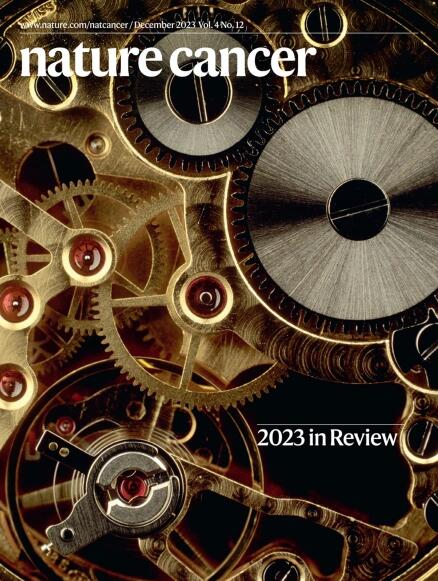Evolving cell states and oncogenic drivers during the progression of IDH-mutant gliomas
IF 23.5
1区 医学
Q1 ONCOLOGY
引用次数: 0
Abstract
Isocitrate dehydrogenase (IDH) mutants define a class of gliomas that are initially slow-growing but inevitably progress to fatal disease. To characterize their malignant cell hierarchy, we profiled chromatin accessibility and gene expression across single cells from low-grade and high-grade IDH-mutant gliomas and ascertained their developmental states through a comparison to normal brain cells. We provide evidence that these tumors are initially fueled by slow-cycling oligodendrocyte progenitor cell-like cells. During progression, a more proliferative neural progenitor cell-like population expands, potentially through partial reprogramming of ‘permissive’ chromatin in progenitors. This transition is accompanied by a switch from methylation-based drivers to genetic ones. In low-grade IDH-mutant tumors or organoids, DNA hypermethylation appears to suppress interferon (IFN) signaling, which is induced by IDH or DNA methyltransferase 1 inhibitors. High-grade tumors frequently lose this hypermethylation and instead acquire genetic alterations that disrupt IFN and other tumor-suppressive programs. Our findings explain how these slow-growing tumors may progress to lethal malignancies and have implications for therapies that target their epigenetic underpinnings. Wu et al. perform single-cell analyses to explore the switch from low-grade to high-grade isocitrate-dehydrogenase-mutant glioma and show that it is characterized by oligodendrocyte progenitor cell-like cells transitioning to proliferative neural progenitor cell-like cells.

IDH突变胶质瘤发展过程中不断演变的细胞状态和致癌驱动因素。
异柠檬酸脱氢酶(IDH)突变体定义了一类胶质瘤,它们最初生长缓慢,但不可避免地会发展成致命疾病。为了描述它们的恶性细胞层次结构,我们分析了低度和高度IDH突变胶质瘤单细胞的染色质可及性和基因表达,并通过与正常脑细胞的比较确定了它们的发育状态。我们提供的证据表明,这些肿瘤最初是由缓慢循环的少突胶质祖细胞样细胞助长的。在发展过程中,可能通过对祖细胞中 "允许 "染色质的部分重编程,增殖性更强的神经祖细胞样细胞群不断扩大。伴随这一转变的是甲基化驱动因素向遗传驱动因素的转变。在低分化 IDH 突变肿瘤或器官组织中,DNA 高甲基化似乎能抑制干扰素(IFN)信号传导,而 IDH 或 DNA 甲基转移酶 1 抑制剂能诱导 IFN 信号传导。高级别肿瘤经常失去这种超甲基化,转而获得基因改变,破坏IFN和其他肿瘤抑制程序。我们的研究结果解释了这些生长缓慢的肿瘤如何发展成为致命的恶性肿瘤,并对针对其表观遗传基础的疗法产生了影响。
本文章由计算机程序翻译,如有差异,请以英文原文为准。
求助全文
约1分钟内获得全文
求助全文
来源期刊

Nature cancer
Medicine-Oncology
CiteScore
31.10
自引率
1.80%
发文量
129
期刊介绍:
Cancer is a devastating disease responsible for millions of deaths worldwide. However, many of these deaths could be prevented with improved prevention and treatment strategies. To achieve this, it is crucial to focus on accurate diagnosis, effective treatment methods, and understanding the socioeconomic factors that influence cancer rates.
Nature Cancer aims to serve as a unique platform for sharing the latest advancements in cancer research across various scientific fields, encompassing life sciences, physical sciences, applied sciences, and social sciences. The journal is particularly interested in fundamental research that enhances our understanding of tumor development and progression, as well as research that translates this knowledge into clinical applications through innovative diagnostic and therapeutic approaches. Additionally, Nature Cancer welcomes clinical studies that inform cancer diagnosis, treatment, and prevention, along with contributions exploring the societal impact of cancer on a global scale.
In addition to publishing original research, Nature Cancer will feature Comments, Reviews, News & Views, Features, and Correspondence that hold significant value for the diverse field of cancer research.
 求助内容:
求助内容: 应助结果提醒方式:
应助结果提醒方式:


